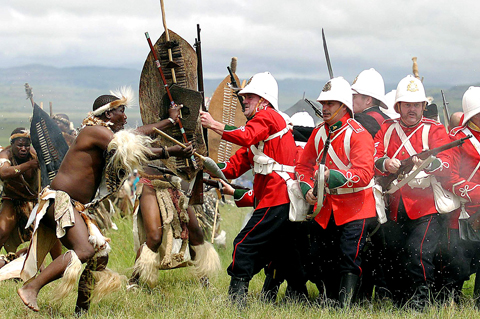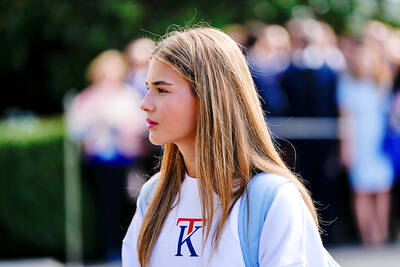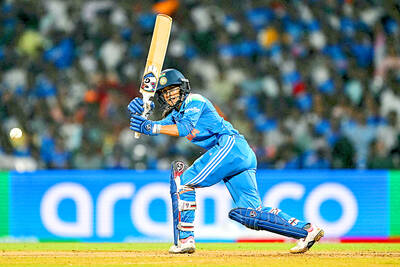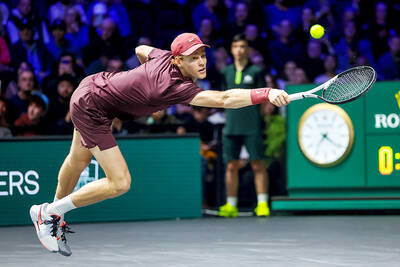Spear-wielding warriors pour over the hilltops to attack a startled red-coat army, in a battlefield re-enactment that hopes to lure World Cup fans away from the stadiums between matches.
South Africa’s 19th-century battlefields gave birth to the Zulu nation, as military genius King Shaka brought a large swath of the country under his rule, only to clash with the British colonizers.
Zulus are now South Africa’s largest ethnic group, at 24 percent of the population, and their history and culture are being turned into a tourist drawcard.

PHOTO: AFP
Anglo-Zulu battlefields and Shaka’s grave and birthplace now anchor a tourism trade in eastern KwaZulu-Natal Province that aims to give foreigners a slice of history and rural South African life.
The province is the most popular vacation destination for South Africans, but struggles to lure foreign visitors away from Cape Town and the winelands on the western coast. Zulu culture has become a key attraction, tourist officials said.
“Cultural tourism has seen a steady rise over the last eight years. We are hoping that the World Cup will expose us to new markets and clients,” said William Adams, a tour guide for Springbok Atlas Tours.
On the Isandlwana Anglo-Zulu warfields, warriors battle red coats in battle re-enactments that show how the British were overpowered in 1879 in one of their worst colonial defeats.
Visitors can try stick-fighting, drink sorghum beer and eat bull’s head meat and intestines.
“Offering something off the beaten track is our major advantage. We are up against all sorts of competitors, so we need to stand out,” said Leo Kroone, owner of Phezulu Village and Safari Lodge. “The Zulu culture is a known brand.”
Marketing Zulu culture is one way of drawing tourists to the tropical coast, where winter temperatures in June and July remain balmy, while much of South Africa is cold, tourist officials said.
Phezulu, which means “high” in Zulu, sits on a hilltop 35km outside Durban, which hosts seven World Cup matches.
At Phezulu, also known as the Valley of a Thousand Hills, guests sleep in modernized thatched cottages, similar to old-style Zulu huts — except for the giant television screen set up in the grounds so fans can watch games.
Some fear that selling an outdated image of Zulus borders on stereotyping and ignores the dynamic reality of South Africa’s increasingly urban culture.
South African President Jacob Zuma, modern South Africa’s first Zulu leader, practices polygamy and wears traditional leopard skins at his weddings.
“Some of these commercial places do not have the interest of culture at heart. They want to come and show the gullible tourists about how the other sides live,” said Sihawu Ngubane, a professor of Zulu language and culture at the University of KwaZulu Natal. “In some cases, historic facts are twisted in a bid to tell the most compelling story. That is exploitation.”
However, KwaZulu tourism chief Ndabo Khoza said the increase in cultural tourism is simply meeting demand from tourists who increasingly express an interest in local life.
“Foreign visitors are intrigued by the rich history of the Zulus, particularly the colonial wars and traditions,” Khoza said.
“The site is popular with British tourists, but locals also come here to marvel at the Zulu prowess,” Khoza said. “We are hoping to build on the success of the World Cup to increase the number of future foreign visitors.”

US President Donald Trump’s granddaughter, Kai Trump, is poised to make her LPGA Tour debut after receiving a sponsor invitation on Tuesday to the Nov. 13 to 16 tournament at Pelican Golf Club in Florida. “My dream has been to compete with the best in the world on the LPGA Tour,” Kai Trump said in a statement posted on the LPGA’s Web site. “This event will be an incredible experience,” she said. “I look forward [to] meeting and competing against so many of my heroes and mentors in golf as I make my LPGA Tour debut.” The 18-year-old high-school senior,

REACTION: Less than 24 hours after a 18-inning Game 3 loss, the Blue Jays’ win ensured that the best-of-seven series is to head back to Toronto for Game 6 tomorrow Vladimir Guerrero Jr on Tuesday blasted a two-run home run as the Toronto Blue Jays bounced back to defeat the Los Angeles Dodgers 6-2 and tie the MLB World Series at two games apiece. Less than 24 hours after a shattering 18-inning Game 3 loss, the Blue Jays climbed off the canvas to breathe new life into their hopes of a first MLB title in 32 years. Guerrero’s two-run blast off Dodgers starter Shohei Ohtani and a superb pitching performance from ace Shane Bieber laid the foundations for a gutsy victory that silenced Dodger Stadium. “I’m always trying to compete

Jemimah Rodrigues on Thursday hit an unbeaten 127 as India pulled off a record chase of 339 against Australia to set up a Women’s World Cup final against South Africa. Rodrigues and skipper Harmanpreet Kaur, who hit 89, put on 167 runs for the third wicket as India won with nine balls and five wickets to spare at DY Patil Stadium, on the outskirts of Mumbai. The hosts finished on a total of 341-5 in reply to Australia’s impressive 338 and ensured there would be a new name on the 50-over trophy tomorrow. Amanjot Kaur hit the winning boundary to trigger wild celebrations

Jannik Sinner on Thursday eased past Francisco Cerundolo 7-5, 6-1 at the Paris Masters to set up a quarter-final clash with Ben Shelton, while reigning champion Alexander Zverev earned a straight-sets win over Alejandro Davidovich Fokina in the third round. A maiden crown in the French capital would return Sinner to No. 1 in the world rankings after current incumbent Carlos Alcaraz suffered a shock early exit at the hands of Britain’s Cameron Norrie. The Italian four-time Grand Slam champion is yet to drop a set in the tournament as he hones in on what would be a fifth title of the